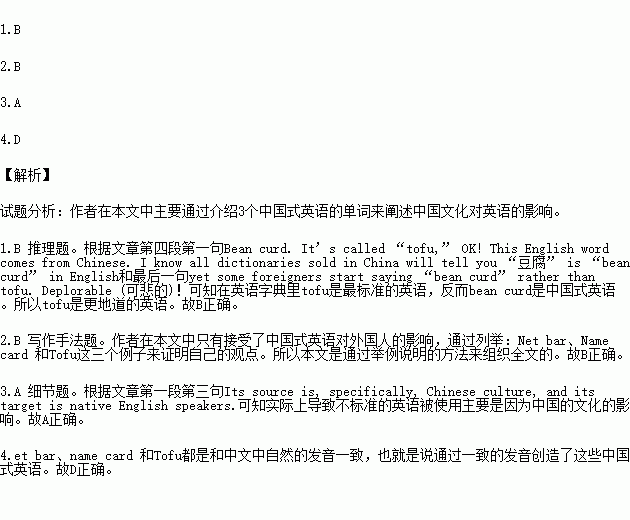题目内容
I’ve been living in China for a while — long enough to observe the long-term deterioration (退化)of my own native language abilities, as well as those of my fellow English speakers. This deterioration can take different forms, one of which is the non-standard usage of the words. Its source is, specifically, Chinese culture, and its target is native English speakers. Below I give some of the common ways that the Chinese environment strikes down the native speaker’s linguistic competence (语言能力) .
Net bar: In Chinese, they’re called “网吧”, This is fine. We generally call them “Internet café” in English. The Chinese seem to think that “网吧” should be translated as “net bar” in English, and many careless foreigners have even been misled by this idea.
Name card: In the English-speaking world, business people have lots of business meetings to discuss business. On these occasions, business people exchange specially printed pieces of paper known as business cards. In China everyone calls them “name cards”, because in Chinese they are called “名片” and “name card” is a more direct translation .
Bean curd. It’s called “tofu,” OK! This English word comes from Chinese. I know all dictionaries sold in China will tell you “豆腐” is “bean curd” in English and that may represent the two characters nicely, but “bean curd” is more a definition than a comfortable translation. And yet some foreigners start saying “bean curd” rather than tofu. Deplorable (可悲的)!
I think you see the pattern. The normal native way of saying something is replaced by a more unnatural way of saying it using other English words.
If you’ve been living in China for a while and find yourself using all of these, you might be on dangerous ground. You’re going to start making a fool of yourself back home. Look out! Resist Chinglish attempts at destroying your own command of your mother tongue!
1.Which of the following expressions is more native?
A.Bean curd B.Tofu C.Name card D.Net bar
2.How does the writer support his main idea?
A.By comparison B.By examples
C.By reasoning D.By refutation (反驳)
3.What is the main cause of the non-standard usage of the words by native English speakers?
A.Chinese culture
B.Chinese tradition
C.English flexibility(灵活性)
D.Chinese polluted environment
4.The mentioned Chinglish words are created in the way ________.
A.that is generally accepted by native English speakers
B.that is often misunderstood by native English speakers
C.that sounds reasonable to native English speakers
D.that sounds natural to some Chinese

